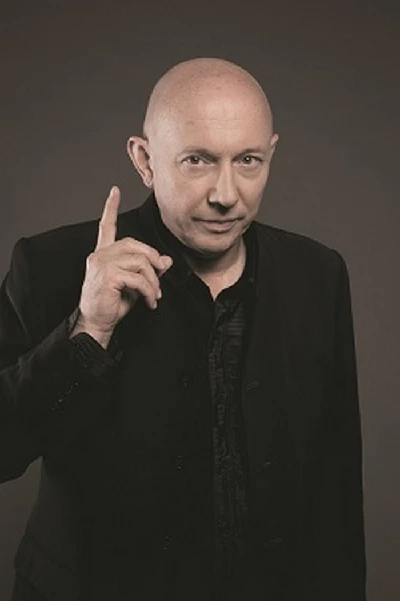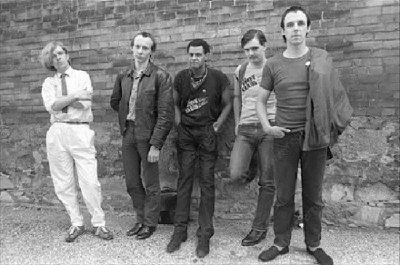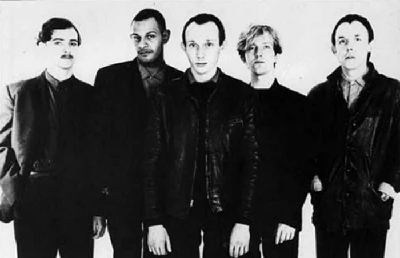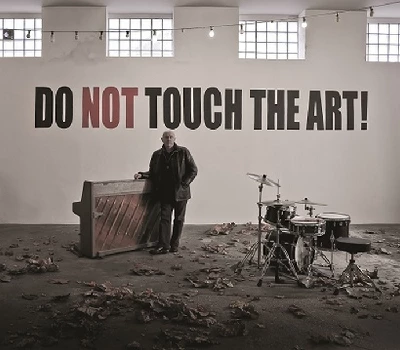published: 27 /
10 /
2011
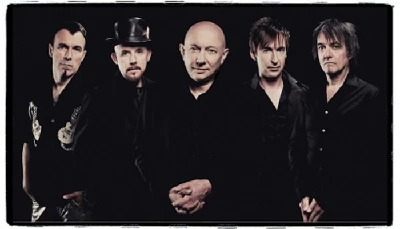
Howard Devoto, the front man with Magazine, speaks to Denzil Watson about 'No Thyself', his reformed band's first album in twenty eight years, and touring
Article
While the whole of the UK currently goes crazy about the Stone Roses’ reunion, a band who managed one great album, let’s cast our minds back to July 2008 and the announcement that another Manchester band was reforming. The reaction may have been less euphoric than the one that greeted Ian Brown, John Squire, Reni and Mani’s announcement, but the news Magazine were to play again, featuring all but one of the original members (the sadly departed guitarist John McGeoch) from their golden era, was eagerly anticipated by those in-the-know. Lyricist and front man Howard Devoto was joined by keyboardist Dave Formula, drummer John Doyle and bassist Barry Adamson. Former Devoto collaborator Noko was chosen to fill John McGeoch’s not inconsiderable shoes on guitar and complete the line-up
The concerts, drawing on songs from the band’s four albums, including three of the best post-punk albums ever to be released, were an overwhelming success. Appearances on ‘Later…with Jools Holland’ and at the Electric Proms followed, as did another string of UK dates. Then the question that faces all bands that reform loomed large. Were Magazine going to take the next step and write and release new material? Fortunately the answer was affirmative. Noko became a permanent member of the band in early 2010 and the quintet started working on new material. Fast forward to October 2011. ‘No Thyself’, the band’s fifth studio album, has just been released ahead of the band embarking on a nine-date UK tour.
Pennyblackmusic caught up with the venerable Howard Devoto on the cusp of the album’s release and found him in ebullient mood.
PB: Why did you decide to reform Magazine after 27 years?
HD: Well, you know my answer to that already. Dave [Formula] told me it was my last change to be venerable!
PB: Did you have offers to reform previously?
HD: We got together in 2005 and we got as far as playing together in rehearsals. But back then I still had a proper job so it wasn’t really very realistic. And if you’re like me, you like to take things a little easier, with less stress involved. But alas, alas, or perhaps fortunately, that job went belly-up at the beginning of 2006, so the next time around I was a little bit more available.
PB: Were you pleased with the way you received in 2009?
HD: Yes I was. It was a pretty amazing year as far as I was concerned.
PB: I was at the first Manchester gig and it was bordering on euphoria.
HD: Well, yes (Laughs). It had been a long time. But in particular that first Manchester date in February 2009 was great.
PB: Reforming the band and playing the original material is one thing, but to then make a new album, that’s quite a big step, isn’t it?
HD: I didn’t know it was going to turn into an album. Those guys suckered me. I got sucked in and I’m still wondering how we ended up making an album! The original idea was two or three new tracks to freshen up the live set for ourselves and for our fans.
We decided at the end of 2009 after we had done Jools Holland and the Electric Proms, at a band meeting that we would do that and in due course I got six tracks from Dave, John and Noko. They’d got together and sent me six tracks. That should have warned me as to how things were going to turn out. But I duly started working on a couple of those. I think it was those that became ‘Happening in English’ and ‘Holy Dotage’ and so I did my stuff, arranged them, turned them into songs and then they went off to Barry to do his stuff.
We were waiting, waiting a long time and the record company were going, “Two songs, three songs, why don’t you make it four songs and then we can make it an EP?” and we went,“Okay.” Then I started saying that we should do some slower songs so the guys started coming out with some slower songs and then the whole thing snowballed and the record company said, “Okay, you’ve got to invade Russia or do a new album,” and so we said, “Okay, we’ll do a new album”.
PB: It must have been a bit daunting to be faced with doing an album after the holy trinity of ‘Secondhand Daylight’, ‘Real Life’ and ‘The Correct Use of Soap’?
HD: Well, you don’t kind of think of it like that and when you’ve written a song you don’t go “Which one should I compare that with to see whether it meets some sort of mark?” It’s just got to pass some test, some benchmark within yourself. That goes for everybody. You are working on a song and you go, “Yes, I like that. We’ll see what the other guys in the band think,” and that’s how you end up with what you end up with. There were a few that didn’t make it. I never got to put any words to them or I started with a part of something, so things did get abandoned.
It didn’t happen suddenly – it was a year, which is a very nice kind of time frame to do an album over. Nobody was expecting it at a certain time. We could have taken two years if we wanted. So that’s very different from the past where you’d normally put two or three months aside, in all, for writing, rehearsing and recording a new album. It's a very different way of working.
PB: Since you released the last Magazine album, ‘Magic, Murder and the Weather’, the way people buy and listen to music has changed drastically, hasn’t it? Did that have any bearing on how you constructed the album at all?
HD: Not really. I was even, at one point, toying with the idea of a device to divide the album into two sides in a rather old fashioned vinyl way because it is twenty minutes or so of a side of vinyl – that’s a certain slot. I take the sequencing of an album quite seriously. It’s different from a live show. A lot of musicians don’t structure their live show or say much between songs, so a live thing is one kind of performance where other elements are going on in between song and the lights and the applause, if you are lucky!
But where you’ve got bare vinyl, unless you do a Frank Zappa type of thing with things coming in between tracks, you’ve got your blank space between the tracks. And to me twenty minutes, that would work very nicely. If you think about it as forty or forty-five minutes then it’s a slightly different animal. But then you can start arguing how many people actually listen to an album all the way through anyway as there’s more of a tendency for people to cherry pick.
Also there’s an instance of the difference between the CD and the download. Between ‘Of Course Howard’ and ‘Final Analysis Waltz’ we kind of spliced those to get the last drum beat to carry over. Then you go, “Well, how’s that going to be done on a download?” So on the download it’s just two separate tracks so that little touch goes because of the format, but what the hell? I’m not grumbling.
PB: Okay, let’s get onto ‘No Thyself’ itself. Having listened to it a few times I’d say that it’s very much classic Magazine with a contemporary twist to it. It’s a very difficult tightrope to walk but I think you achieved it very well.
HD: Well, thank you very much, those are very kind words. If we did, then in a way I can’t remember consciously talking about that. We do talk about the elements of the Magazine sound. Noko talks about the Magazine “aesthetic“ and the guys have consciously gone back to some of the original instruments. So yes, there was definitely an element of that.
We like our old albums and they seem to have stood the test of time. People still seem to like them. There’s no reason to throw it all open and become a modern jazz ensemble or anything else. So we were aware of all that and our identity that we have with people. Without belabouring it –we were aware of some of that. And yes, it does seem in line with the first three albums.
PB: ‘Other Thematic Material’ from the album sonically sounds like would have sat nicely on ‘Real Life’, but I just wondered what was going through your mind when you wrote those lyrics?
HD: Nothing specific, just innocent thoughts. The start of it was when I read an article about four years ago in one of the broadsheets. Some women were talking about their experiences on first dates and apparently this could be the part of latest dating methods, so I was kind of thinking how this could work out within a longer-term relationship as it were.
PB: ‘Hello Mr Curtis (with apologies)’ is one of the stand-out tracks on the new album for me. I guess you’re talking about Ian Curtis of Joy Division.
HD: Yes, it’s all within a world music context...and Kurt Cobain and Elvis Presley. And even the little modification on the Who lyric at the end.
PB: It gets a little bit soulful on ‘Physics’, doesn’t it?
HD: Yes, it’s going to be interesting to see how people take to that track. It’s one of my favourites on the album and I particularly like what would have been side one. The first five songs, I’m particularly pleased how they work together, so ‘Physics’ is effectively the end of side one. Dave originated that. Dave’s had a great album with this one. That was Dave’s track and, as I recall, I took his arrangement and added a couple of bars at one point and we transposed it and the song was then very quick in development.
PB: ‘Happening in English’ would open side two in that case. What exactly is the song about and what, exactly, is happening in English?
HD: I was reading a book about the English Language. Something like ‘50 Things You Didn’t Know About the English Language’ and the writer talked about “something happening in English?” and I went “Mmmmm, when things happen, do they happen in a language?” Somebody walked down the street in English or say French?
PB: Who are you addressing in ‘Final Analysis Waltz’ when you sing, “I don’t give a fuck about you two”.
HD: (Laughs) I’m kind of talking a variety of people who are addressed in it. Hey Mister, hey mate, hey man, hey baby and hey buddy. In some ways it’s a perverse request for tolerance, in my strange way of thinking, and for a little appreciation of the shared world we have to rub along together in.
PB: Overall were you happy with the way the album turned out?
HD: Oh, yes, but it was not easy. It took over a year and also Barry [Adamson] left.
PB: Was that a blow?
HD: When he quit, I certainly reflected on the fact that of the four guys that walked into a recording studio to record ‘Shot By Both Sides’ I was the only one left in the band, which was quite a moment of sadness for me. And yes, he’s a great musician and a great bass player, but he was reticent about us doing new material and the commitment it would involve, because for a start, he was directing his first film last year. But he was right. The commitment is quite substantial to do it properly, so I understand. Having seen the whole thing through, I do understand his feelings.
PB: On the chat forum of a fairly well-known punk band, there’s a pretty substantial Magazine thread. One post, when the news about Barry not being in the band any more surfaced, described the current incarnation of Magazine as a “travesty”, due to there only being three original members in the line-up. What would you say to him?
HD: I’d just say listen to our album. I think that that knocks all of that on the head. We can’t do anything, sadly, about John McGeoch. Nobody can bring him back.
PB: To be honest one of the features of the new album is just how good Noko’s guitar playing is, isn’t it?
HD: Sure, I’d quite agree. But also Stan White, who replaced Barry, is a fantastic bass player too. So I think we’re all very happy with it.
PB: For the tour in November you’re now in the slightly different position of having new material to draw from. Is it going to be the new album with a few old Magazine classics or the pick of the new album blending into the previous set?
HD: We won’t be over-egging it with new songs. I’d like to think that we’d got time over the coming weeks, months, years to draw on the album, so I see no reason to push a lot of it at people at this time. I think we can just take it gradually. But, yes, we will play a few new songs.
PB: Okay, some quick-fire questions. What’s your favourite Magazine album out of the four from the first time around?
HD: Probably ‘The Correct Use of Soap’.
PB: Are you really angry, ill and as ugly as sin?
HD: (Laughs) On ugly, you can decide for yourself. Back then I was certainly angry and somewhat ill of mind. Fortunately most of that has gone now. I think it would be rather inelegant to be that way still, approaching the age of 60.
PB: Before you go on stage do you still get that little buzz?
HD: Yes, and the feeling of entering some other world.
PB: Which lyric that you have penned are you most of proud of?
HD: I think I’ll attempt to sidetrack you on this one. Do you know the one called ‘Of Course Howard’? That comes from the introduction to a black and white booklet that I wrote in 1979 called ‘Thirty Lyrics’. It was just an A4 booklet thing that we put out and by that point I’d written thirty songs, and I penned an introduction to it.
I happened to re-read it last year and the opening sentence to it is “I demand special attention as the most human,” and it sort of continues in that vein and I read this and I went, “Wow, you were really going for it guy, weren’t you?” and I just thought that I wanted to integrate it into Magazine thirty years later. I’m not saying that it’s my favourite lyric, but it’s my way of trying to answer that awkward question.
PB: Last question. Is there any current music that excites you and that has had some influence on the new album?
HD: Can I think of any music that has had an influence on me? That might be a slightly easier question to answer. I don’t think I can come up with anything. I think we’re too old to have any influences.
PB: I’m guessing you must be a Captain Beefheart fan though.
HD: Well, I certainly was. I wouldn’t claim to listen to much Captain Beefheart these days, but, yes, in the old days. Do you think you can still see his influence on us?
PB: Not particularly. The reason I really ask was down to your great cover of ‘I Love You, You big Dummy’. You really made that song your own.
HD: That went back to my time in Buzzcocks. We did a version of it very early on, so that really goes back a while.
PB: Final, final question. Of all the many and various cover versions of Magazine songs that have been done, which is your favourite?
HD: (Laughs) Oh, I wouldn’t dare say. I wouldn’t like to single anyone out. They’re all wonderful.
PB: Is it interesting to see how other people interpret you songs?
HD: Oh yes, but sometimes I wish they’d go further and rip it to pieces.
PB: Thank you.
Picture Gallery:-
